Solutions Engineers are the technical backbone of sales teams, bridging the gap between customer needs and the technical capabilities of a product. They work closely with clients to understand their requirements and demonstrate how their company's solutions can address those needs.
Skills required for a Solutions Engineer include a strong understanding of technical concepts, excellent communication abilities, and the capacity to solve complex problems. These professionals must be adept at both technical and interpersonal skills to effectively convey the value of their solutions.
Candidates can write these abilities in their resumes, but you can’t verify them without on-the-job Solutions Engineer skill tests.
In this post, we will explore 7 essential Solutions Engineer skills, 10 secondary skills and how to assess them so you can make informed hiring decisions.
Table of contents
7 fundamental Solutions Engineer skills and traits
The best skills for Solutions Engineers include Technical Proficiency, Problem-Solving, Communication Skills, Customer Focus, Project Management, Analytical Thinking and Sales Acumen.
Let’s dive into the details by examining the 7 essential skills of a Solutions Engineer.
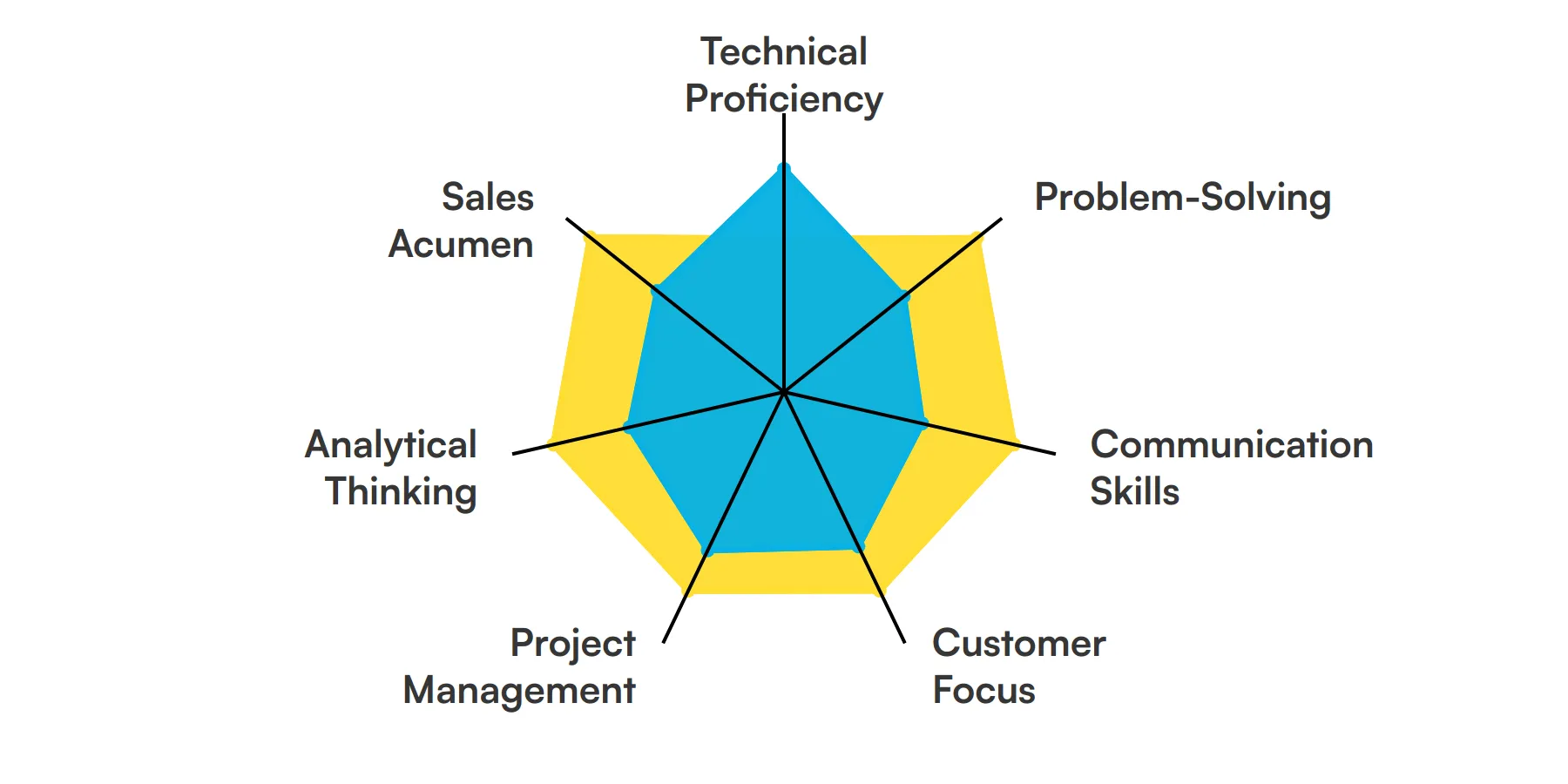
Technical Proficiency
A solutions engineer must have a strong grasp of various technologies, including software, hardware, and networking. This knowledge allows them to understand client needs and design appropriate solutions.
For more insights, check out our guide to writing a Solutions Engineer Job Description.
Problem-Solving
In this role, you will encounter complex issues that require innovative solutions. Being able to think critically and troubleshoot effectively is key to resolving client challenges.
Communication Skills
Clear and concise communication is essential for explaining technical concepts to non-technical stakeholders. This ensures that everyone involved understands the proposed solutions and their benefits.
Customer Focus
Understanding and prioritizing the needs of the customer is crucial. A solutions engineer must be able to tailor solutions that meet specific client requirements and enhance their overall experience.
Check out our guide for a comprehensive list of interview questions.
Project Management
Managing multiple projects simultaneously requires strong organizational skills. This includes planning, executing, and monitoring projects to ensure they are completed on time and within budget.
Analytical Thinking
Analyzing data and metrics helps in making informed decisions. Solutions engineers use this skill to evaluate the effectiveness of their solutions and make necessary adjustments.
For more insights, check out our guide to writing a Data Analyst Job Description.
Sales Acumen
While not a sales role, understanding the sales process and having the ability to support sales teams is important. This includes demonstrating the value of solutions to potential clients.
10 secondary Solutions Engineer skills and traits
The best skills for Solutions Engineers include Coding Knowledge, Networking, Cloud Computing, Database Management, APIs and Integrations, Security Awareness, UX/UI Design, Documentation, Time Management and Adaptability.
Let’s dive into the details by examining the 10 secondary skills of a Solutions Engineer.
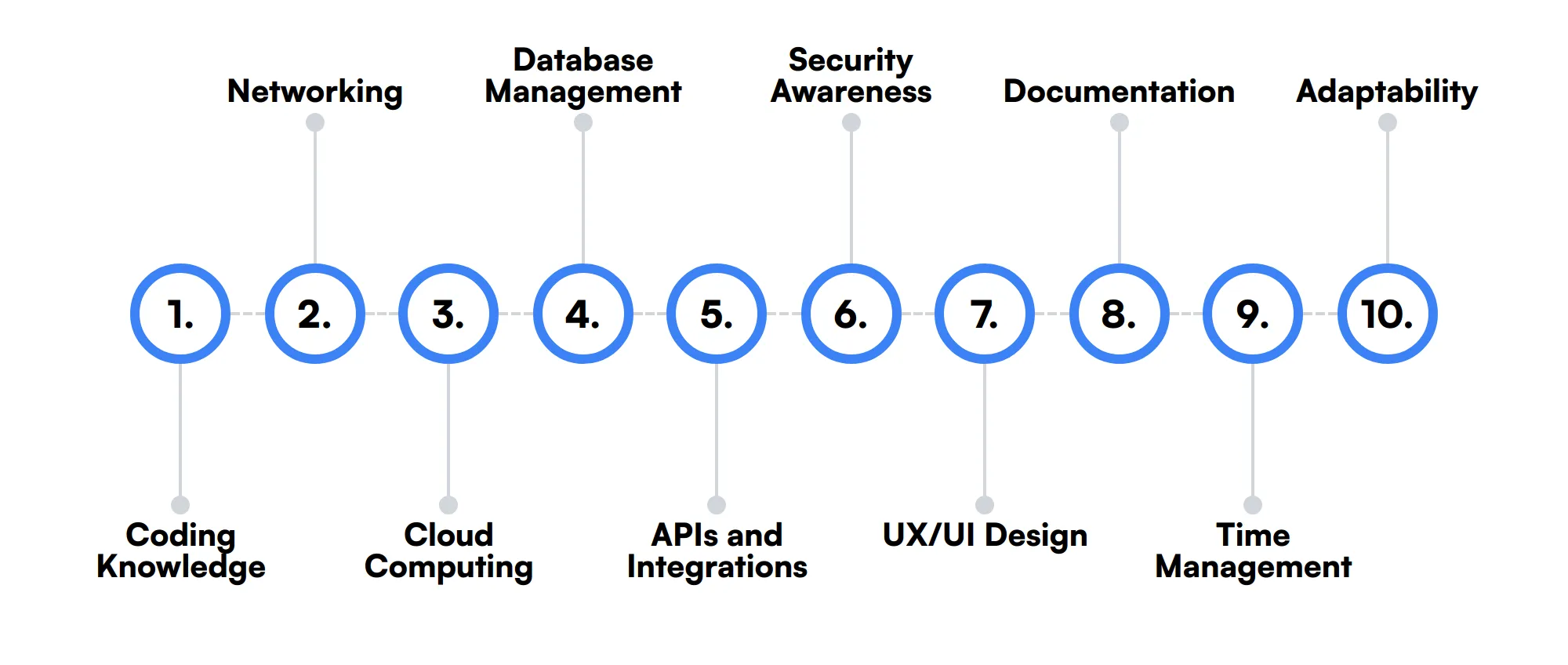
Coding Knowledge
Basic coding skills can be beneficial for creating custom solutions or understanding the technical aspects of a product.
Networking
Knowledge of networking principles helps in designing solutions that require robust and secure network infrastructure.
Cloud Computing
Familiarity with cloud platforms like AWS, Azure, or Google Cloud can be advantageous for designing scalable and flexible solutions.
Database Management
Understanding database systems is useful for creating solutions that involve data storage, retrieval, and management.
APIs and Integrations
Knowing how to work with APIs and integrate different systems can enhance the functionality of the solutions you design.
Security Awareness
Being aware of cybersecurity principles ensures that the solutions you design are secure and protect client data.
UX/UI Design
A basic understanding of user experience and interface design can help in creating solutions that are user-friendly and intuitive.
Documentation
Creating clear and comprehensive documentation is important for ensuring that clients and team members can understand and use the solutions effectively.
Time Management
Effectively managing your time ensures that you can handle multiple tasks and projects without missing deadlines.
Adaptability
Being adaptable allows you to quickly adjust to new technologies and changing client requirements, ensuring that you can always provide the best solutions.
How to assess Solutions Engineer skills and traits
Assessing the skills and traits of a Solutions Engineer can be a challenging task, given the diverse range of competencies required for the role. From technical proficiency and problem-solving abilities to communication skills and customer focus, a Solutions Engineer must wear many hats. It's not just about what they know, but how they apply their knowledge in real-world scenarios.
Traditional resumes and interviews often fall short in providing a comprehensive view of a candidate's capabilities. This is where skills-based assessments come into play. By leveraging tools like Adaface assessments, you can gain a clearer understanding of a candidate's technical and soft skills, leading to 2x improved quality of hires and an 85% reduction in screening time.
When evaluating a Solutions Engineer, it's important to consider their project management skills, analytical thinking, and sales acumen, in addition to their technical and problem-solving abilities. A well-rounded assessment approach will help you identify candidates who not only meet the technical requirements but also excel in customer interactions and project execution.
Let’s look at how to assess Solutions Engineer skills with these 6 talent assessments.
Technical Aptitude Test
Our Technical Aptitude Test evaluates a candidate's general technical aptitude and problem-solving skills. It covers programming fundamentals, data structures, algorithm basics, and technical aptitude.
The test includes scenario-based multiple-choice questions on topics like basic computer concepts, programming fundamentals, data structures, time complexity, database management, networking and security, system administration, web development, and software engineering. Candidates are also assessed on their ability to apply critical thinking, logical reasoning, and analytical skills to solve complex technical problems.
Successful candidates demonstrate a strong understanding of programming fundamentals, data structures, and algorithm basics. They also show proficiency in applying critical thinking and logical reasoning to technical scenarios.
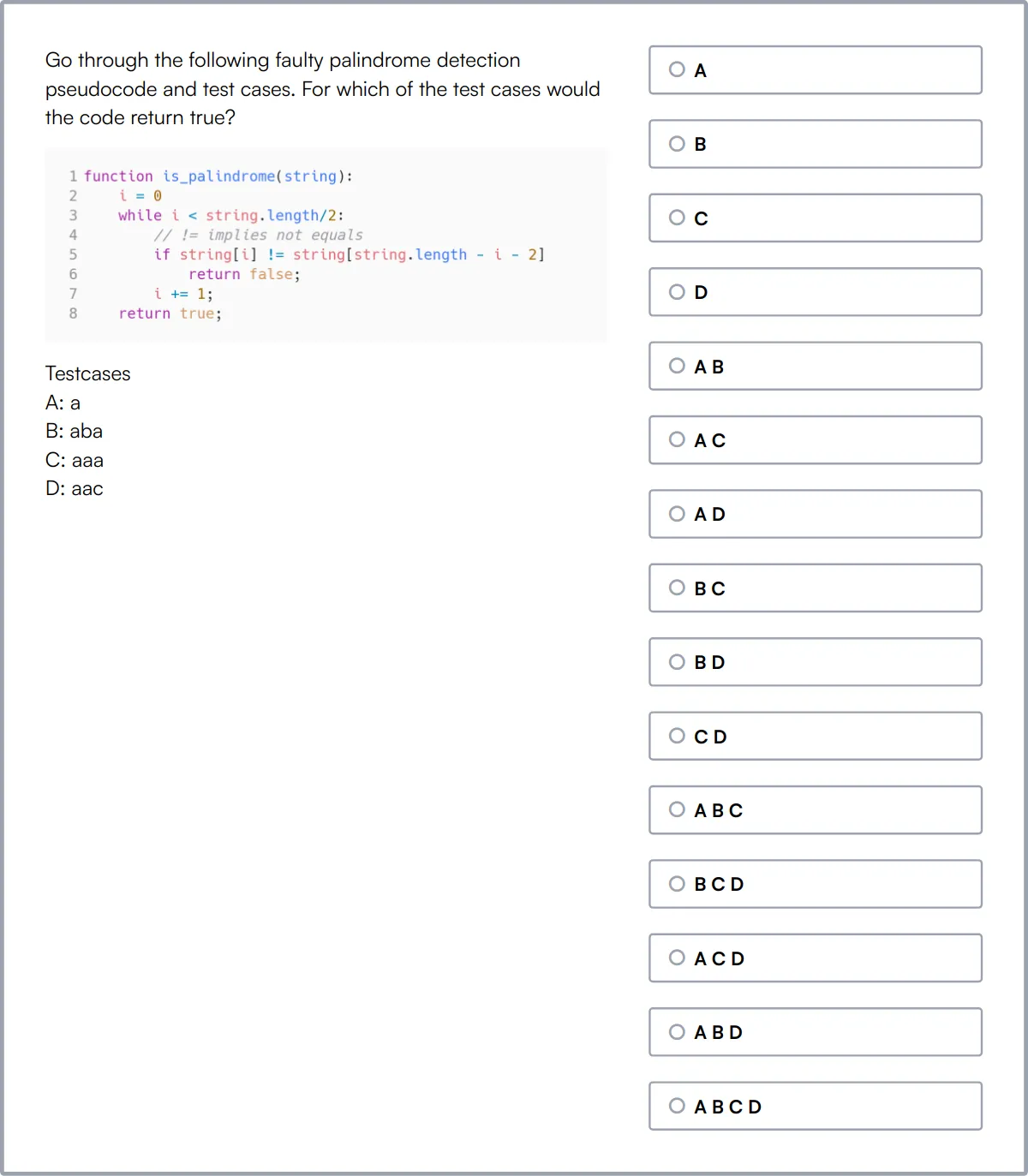
Problem Solving Test
Our Problem Solving Test evaluates a candidate's ability to understand instructions, analyze data, and respond to complex problems or situations. It covers abstract reasoning, critical thinking, deductive reasoning, inductive reasoning, pattern matching, and spatial reasoning.
The test includes questions designed to provide insights into a candidate's problem-solving abilities, learning agility, and coachability. It features logical reasoning, data interpretation, spatial reasoning, abstract reasoning, and critical thinking questions.
Candidates who perform well on this test demonstrate strong analytical skills, the ability to identify patterns, and the capacity to think critically and logically in various scenarios.
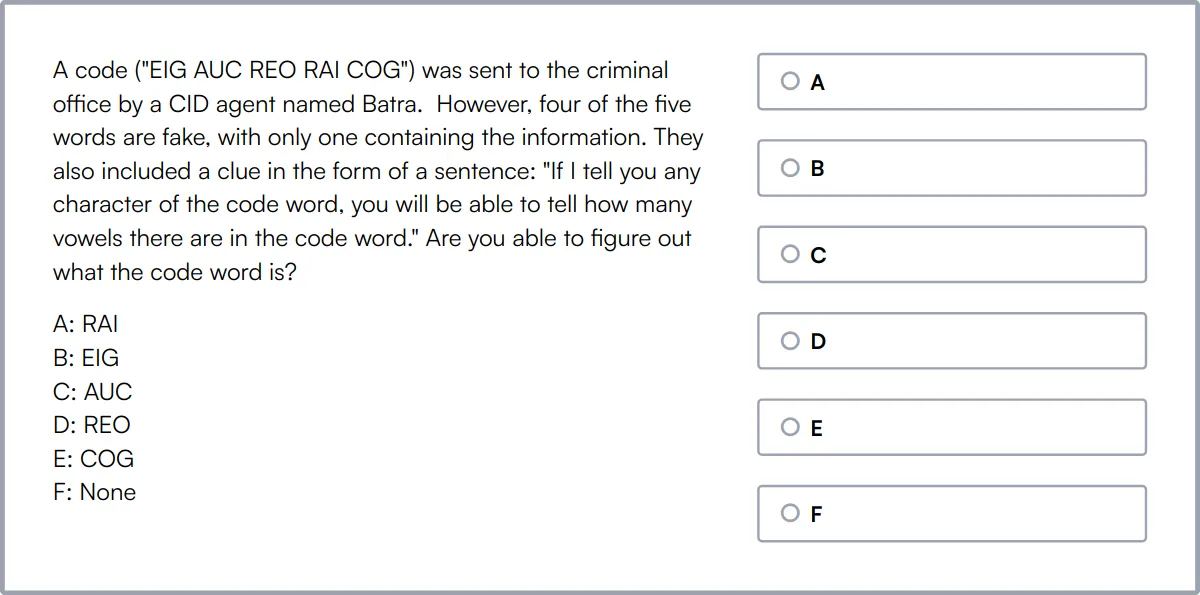
Communication Skills Test
Our Communication Skills Test evaluates candidates' communication skills, including verbal and written communication, active listening, and interpersonal skills. It also covers situational judgement, attention to detail, critical thinking, and verbal reasoning.
The test includes situational judgement, communication skills, critical thinking, and verbal reasoning questions. It assesses a candidate's ability to effectively communicate with customers, colleagues, and stakeholders in various professional scenarios.
High-scoring candidates demonstrate strong verbal and written communication skills, the ability to think critically, and the capacity to handle situational judgement scenarios effectively.
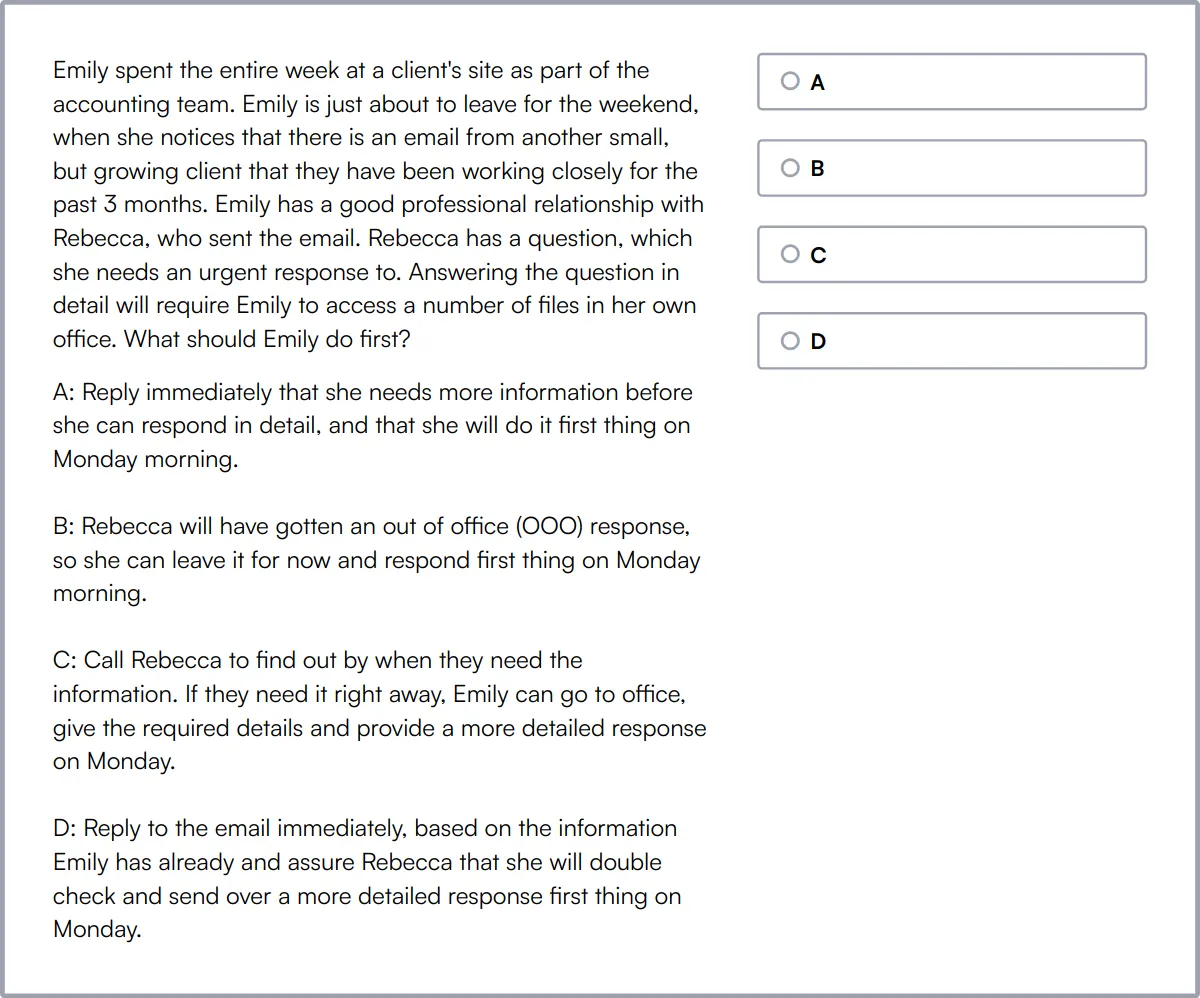
Customer Service Aptitude Test
Our Customer Service Aptitude Test evaluates a candidate's skills in customer service, attention to detail, problem-solving, verbal reasoning, numerical reasoning, and logical reasoning.
The test includes customer service, situational judgement, abstract reasoning, verbal reasoning, and English questions. It assesses a candidate's ability to handle customer interactions, solve problems, and communicate effectively.
Successful candidates show strong customer service skills, attention to detail, and the ability to reason logically and verbally in various scenarios.
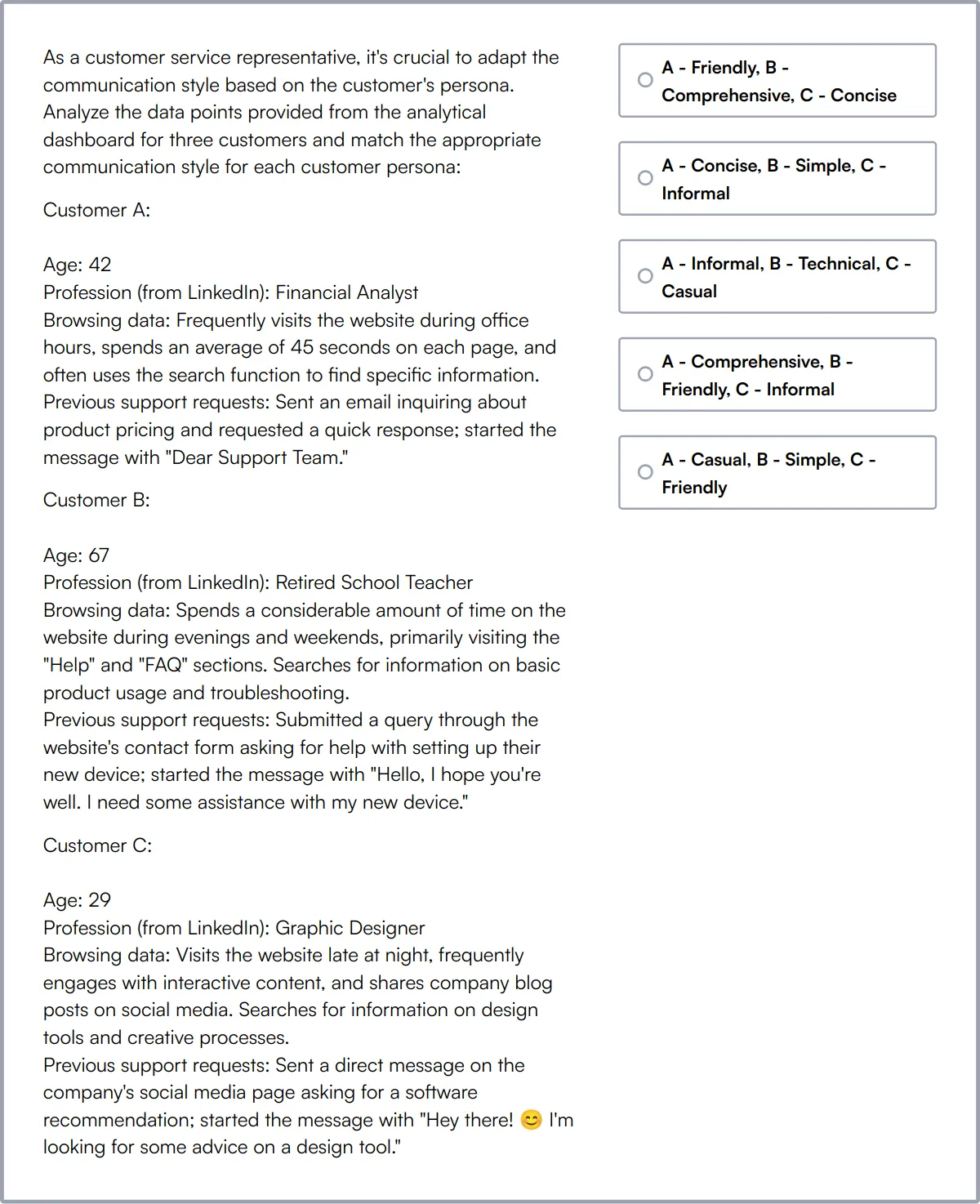
Project Management Test
Our Project Management Test assesses a candidate's ability to plan projects from conception to implementation. It covers cost and budget estimation, situational judgement, understanding of key project roles and stages, and designing a project plan.
The test includes project management, critical thinking, and Agile/Scrum questions. It evaluates a candidate's ability to map timelines, assess risks, allocate budgets, execute the project life-cycle, manage stakeholders, debug issues, and deliver a product or service.
Candidates who excel in this test demonstrate strong project management skills, the ability to handle resources and stakeholders, and proficiency in both Agile and traditional project management methodologies.
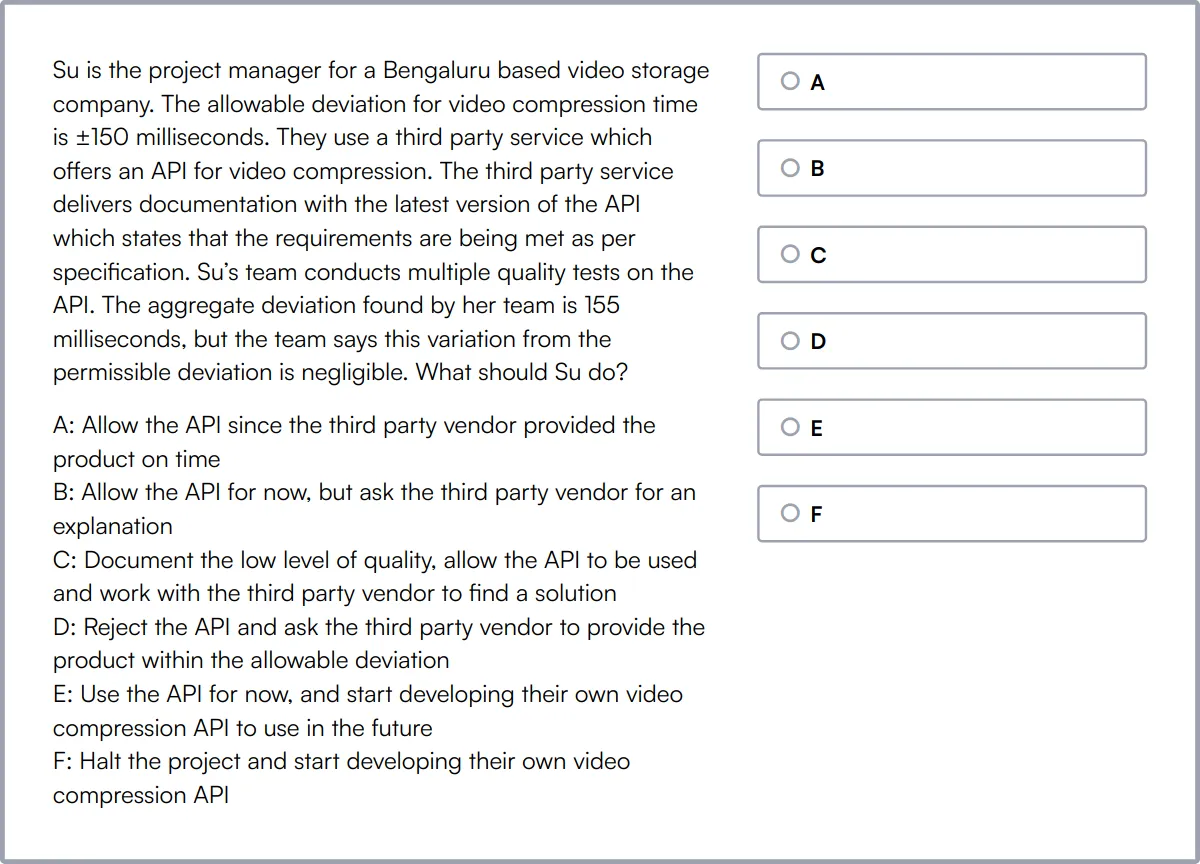
Analytical Skills Test
Our Analytical Skills Test evaluates a candidate's ability to comprehend scenarios, identify key information, apply logic, find patterns, and draw conclusions. It covers logical reasoning, data visualization, data sufficiency, verbal reasoning, numerical reasoning, critical thinking, and problem-solving.
The test includes numerical reasoning, logical reasoning, spatial reasoning, and data interpretation questions. It assesses a candidate's ability to analyze data, identify patterns, and apply logical reasoning to solve problems.
High-scoring candidates demonstrate strong analytical skills, the ability to interpret data accurately, and proficiency in logical and numerical reasoning.
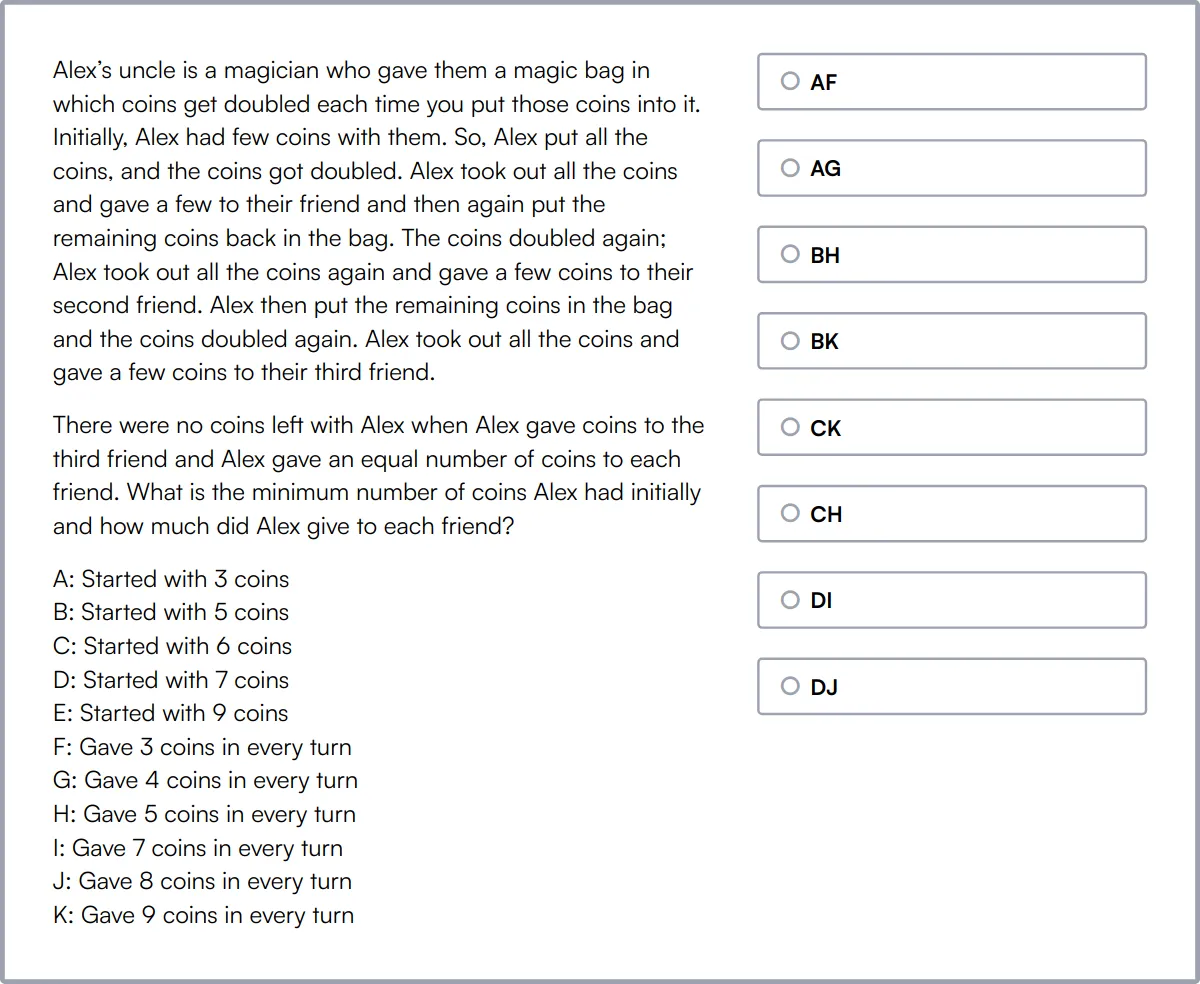
Summary: The 7 key Solutions Engineer skills and how to test for them
| Solutions Engineer skill | How to assess them |
|---|---|
| 1. Technical Proficiency | Evaluate understanding of relevant technologies and tools. |
| 2. Problem-Solving | Assess ability to identify and resolve complex issues. |
| 3. Communication Skills | Gauge clarity and effectiveness in conveying technical concepts. |
| 4. Customer Focus | Measure responsiveness and attentiveness to client needs. |
| 5. Project Management | Check capability to plan, execute, and oversee projects. |
| 6. Analytical Thinking | Determine skill in analyzing data and drawing conclusions. |
| 7. Sales Acumen | Evaluate understanding of sales processes and strategies. |
Salesforce Administrator Test
Solutions Engineer skills FAQs
What technical skills should a Solutions Engineer have?
A Solutions Engineer should be proficient in coding, cloud computing, database management, and understanding APIs and integrations. Knowledge of networking and security protocols is also important.
How can you assess problem-solving skills in Solutions Engineers?
Assess problem-solving skills by presenting candidates with real-world scenarios related to your business. Observe how they approach the problem, the creativity of their solutions, and their ability to simplify complex processes.
What are the key communication skills for a Solutions Engineer?
Effective communication skills include the ability to clearly explain technical details to non-technical stakeholders, active listening, and the capability to present ideas persuasively and concisely.
Why is customer focus important for a Solutions Engineer?
Customer focus is key because Solutions Engineers often tailor systems to meet specific client needs. They must understand and anticipate client requirements to deliver relevant and effective solutions.
How important is project management for a Solutions Engineer?
Project management is critical as it helps Solutions Engineers to plan, execute, and deliver solutions within scope, time, and budget constraints, ensuring successful project outcomes.
What role does UX/UI design play in a Solutions Engineer's job?
UX/UI design skills are important for creating intuitive and user-friendly interfaces that enhance the overall effectiveness of the solutions provided, leading to higher user satisfaction and engagement.
How can sales acumen be beneficial for Solutions Engineers?
Sales acumen helps Solutions Engineers understand and align solutions with the business goals of their clients, effectively communicate value propositions, and support the sales team in closing deals.
What is the significance of time management in the Solutions Engineer role?
Time management is crucial for balancing multiple projects and deadlines, ensuring that all tasks are completed efficiently and on time, which is essential for maintaining project timelines and client satisfaction.

40 min skill tests.
No trick questions.
Accurate shortlisting.
We make it easy for you to find the best candidates in your pipeline with a 40 min skills test.
Try for freeRelated posts
Free resources



